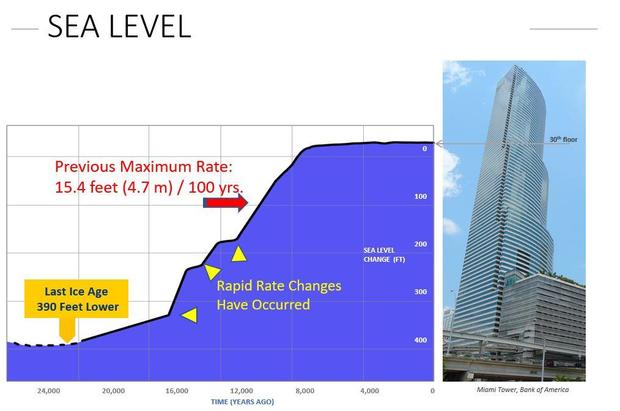 |
"Historically speaking, simple math reveals that for every degree Fahrenheit the Earth warms, sea-level eventually rises by an astonishing 24 feet. There is, however, a sizable lag time between warming, melting and consequent sea-level rise.
Considering that Earth has already warmed 2 degrees Fahrenheit since the late 1800s, we know that substantial sea-level rise is already baked in, regardless of whether we stop global warming. Scientists just don't know exactly how long it will take to see the rise or how fast it will occur. But using proxy records, glaciologists can see that as we emerged from the last Ice Age, sea level rose at remarkable rates — as fast as 15 feet per century at times.
That said, the fact that there is a lot less ice on Earth today than there was 20,000 years ago means the amount of sea-level rise per degree would likely be less now, and the maximum pace may be tempered as well. But even a pace that's half the historical maximum would still be catastrophic to an Earth with billions of people who depend on stability.
We must also remember that warming today, due to human-caused climate change, is happening faster than it has in at least 2,000 years and possibly over 100,000 years. So scientists just don't have a directly comparable situation to measure against — once again highlighting our uncertain future.
While scientists and scientific periodicals tend to be conservative in their public projections of sea-level rise, scientists will often remark that they are concerned it may be much worse. When CBS News asked Englander what he thinks is a "realistic range" of sea-level rise by 2100, he said, "With the current global temperature level and rate of temperature increase I believe that we could get 5 to 10 feet before the end of this century."
While this is just one expert's opinion, if sea-level rise even comes close to those levels, the impacts would be truly dangerous and destabilizing, dramatically reshaping nations' coastlines and forcing hundreds of millions of people to abandon their homes. Englander says to reduce the potential impacts, it is better to be prepared for a worst-case scenario.
"We need to begin planning and designing for that while there is time to adapt.""
No comments:
Post a Comment